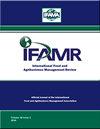Exploring the use of blockchain-based tokens in the wine industry
IF 1.5
4区 经济学
Q3 AGRICULTURAL ECONOMICS & POLICY
International Food and Agribusiness Management Review
Pub Date : 2024-03-26
DOI:10.22434/ifamr2023.0080
引用次数: 0
Abstract
A recent publication reports that the number of active Non-Fungible Tokens (NFTs) in self-custodial wallets has grown exponentially in the past years across several industries. This study analyzed 65 token-based use cases in the wine sector. It was found that most current applications revolve around the downstream part of the supply chain. The research has also demonstrated that the various solutions involving fungible tokens and NFTs can be classified into three categories. Consequently, a taxonomy has been introduced. Furthermore, it was identified that digital tokens can solve current challenges in the wine industry related to provenance, proof of origin, authenticity, and fraud prevention. At the same time, the utilization of tokens enables an extended consumer interaction with the product. Managers potentially considering connecting their physical products and services with digital tokens can obtain insights towards their use in the web3 economy.探索区块链代币在葡萄酒行业中的应用
最近的一份出版物报告称,在过去几年中,自保管钱包中活跃的不可封代币(NFT)数量在多个行业中呈指数级增长。这项研究分析了葡萄酒行业中 65 个基于代币的使用案例。研究发现,目前大多数应用都围绕着供应链的下游环节。研究还表明,涉及可替代代币和 NFT 的各种解决方案可分为三类。因此,引入了分类法。此外,研究还发现,数字令牌可以解决葡萄酒行业当前面临的与来源、原产地证明、真实性和欺诈防范相关的挑战。同时,利用代币还能扩大消费者与产品的互动。有可能考虑将其实体产品和服务与数字代币联系起来的管理者,可以深入了解数字代币在网络经济中的应用。
本文章由计算机程序翻译,如有差异,请以英文原文为准。
求助全文
约1分钟内获得全文
求助全文
来源期刊

International Food and Agribusiness Management Review
AGRICULTURAL ECONOMICS & POLICY-
CiteScore
2.90
自引率
0.00%
发文量
0
审稿时长
>12 weeks
期刊介绍:
The IFAMR is an internationally recognized catalyst for discussion and inquiry on issues related to the global food and agribusiness system. The journal provides an intellectual meeting place for industry executives, managers, scholars and practitioners interested in the effective management of agribusiness firms and organizations.
IFAMR publishes high quality, peer reviewed, scholarly articles on topics related to the practice of management in the food and agribusiness industry. The Journal provides managers, researchers and teachers a forum where they can publish and acquire research results, new ideas, applications of new knowledge, and discussions of issues important to the worldwide food and agribusiness system. The Review is published electronically on this website.
The core values of the Review are as follows: excellent academic contributions; fast, thorough, and detailed peer reviews; building human capital through the development of good writing skills in scholars and students; broad international representation among authors, editors, and reviewers; a showcase for IFAMA’s unique industry-scholar relationship, and a facilitator of international debate, networking, and research in agribusiness.
The Review welcomes scholarly articles on business, public policy, law and education pertaining to the global food system. Articles may be applied or theoretical, but must relevant to managers or management scholars studies, industry interviews, and book reviews are also welcome.
 求助内容:
求助内容: 应助结果提醒方式:
应助结果提醒方式:


